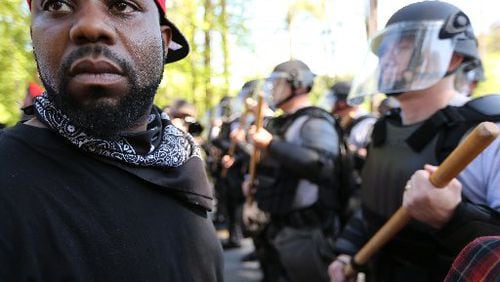The momentum behind a proposed museum at Stone Mountain that would mark the achievements of black Civil War veterans has been slowed down by the same forces that proponents say led to the need for it in the first place — racist groups and protesters.
Bill Stephens, CEO of the Stone Mountain Memorial Association, said a recent string of protests and rallies at Stone Mountain, mostly instigated by people with ties to the Ku Klux Klan and other white supremacist groups, have been major distractions.
“The protests and rallies have taken a good deal of time here in the first part of the year,” Stephens said. “It has been an interesting time and an unwelcome distraction from some of the planning we have wanted to do.”
Michael Hill, president of the League of the South, a Killen, Ala.-based secessionist and white separatist organization, was surprised to hear that their efforts had indirectly made an impact.
“Our intention was to honor our ancestors and bring attention to the fact that Stone Mountain is a monument to the Confederacy,” Hill said. “It was not our tactical intention to set back the museum, but I am glad we have. We don’t support the idea of a museum that would distract from the original intent of Stone Mountain.”
While distracted, Stephens said officials at Stone Mountain are still moving forward with plans to build the museum and hope to make “significant progress during the second half of this year.”
“We are still in the first phase of the project,” Stephens said. “We are looking at similar efforts elsewhere, identifying researches and scholars who have already done some of this legwork, sourcing exhibit builders and craftsmen whom we can afford to build out and determining where best in our large park and limited interior physical spaces to best locate the exhibit for maximum visitation and impact,” Stephens said.
Last October, Stone Mountain officials announced plans to create not only a museum at the site but to also erect a monument atop the mountain in honor of Martin Luther King Jr.
The following month, Confederate flag supporters — some tied to the International Keystone Knights of the Ku Klux Klan — gathered at Stone Mountain with two things in mind: keeping the mountain “pure” to its Confederate roots and keeping the King memorial off of it.
The ambitious King idea was quietly scrapped in favor of the more tenable museum component, which would be a permanent museum exhibit and would tell the story of the black role in the Civil War.
But both concepts came in the middle of Stone Mountain becoming a symbolic target for and against the symbols of so-called white supremacy — most notably the Confederate Flag.
Following the Charleston Massacre last June, where nine members of Emanuel African Methodist Episcopal Church were gunned down by Dylann Roof, who was often pictured casually hoisting a Confederate flag and guns, attempts to remove public displays of the flag intensified.
On Aug. 1, 2015, as many as 800 people, from groups like the Sons of Confederate Veterans and the League of the South, rallied at Stone Mountain having been convinced that their way of life and legacy were under attack.
Hill said they were fighting attempts to be “politically correct.”
Stephens said preparation for an April 23 event, which attracted hundreds of protesters and counter-protesters spread throughout the park, was "particularly intense."
White supremacists gathered for the so-called Rock Stone Mountain, while a separate group composed of Confederate flag supporters, an integrated biker group and some militia members met at the big lawn under the mountain carving of Confederate war leaders. Meanwhile, counter-protesters gathered to oppose what they say was a message of hate at the rally.
At least nine counter protesters were arrested after clashes with police and attempts to get close to the white supremacists. A barricade was set ablaze, and rocks and fireworks were hurled at police officers working to keep the warring factions apart. Park officials had to cancel the popular laser show and shut down the cable car and amusement area as the situation escalated.







